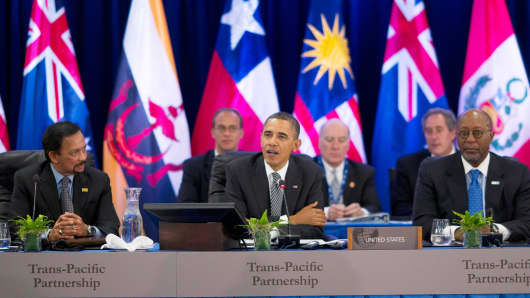The conventional wisdom in Washington is that very little of substance can get done during the long presidential election season. But there is one major action Congress should take immediately that will have a major impact on our nation's ability to drive economic growth and grow jobs – and that's passage of the Trans-Pacific Partnership (TPP). President Obama urged Congress to do so in his State of the Union address.
For those of you who don't know, the TPP is a free-trade agreement including the United States, Canada and 10 other Pacific Rim nations. Combined, this trading block comprises nearly 40 percent of the world's gross domestic product and will have a major impact on our nation's ability to drive U.S. economic and job growth. This landmark agreement will break down barriers that prevent the free flow of goods, services, and information over borders.





